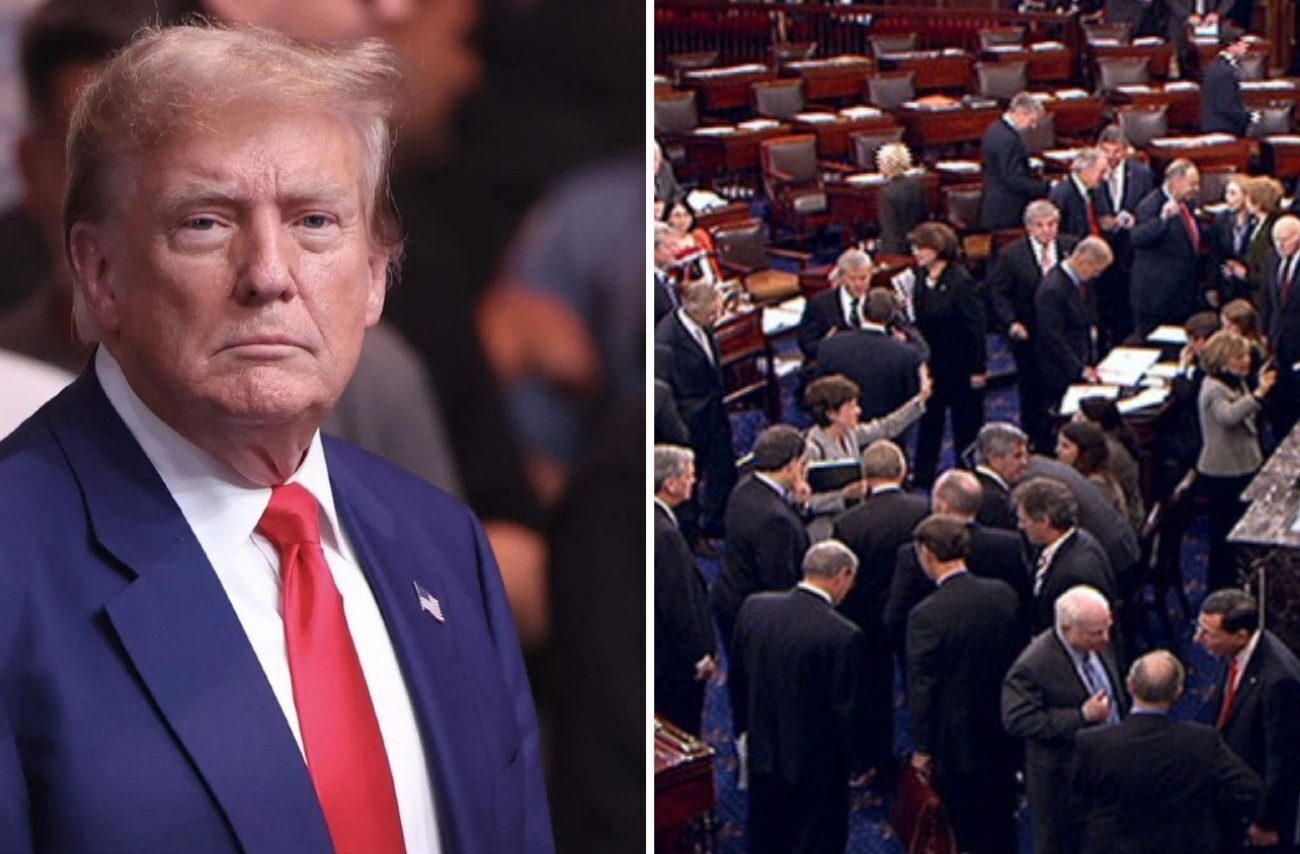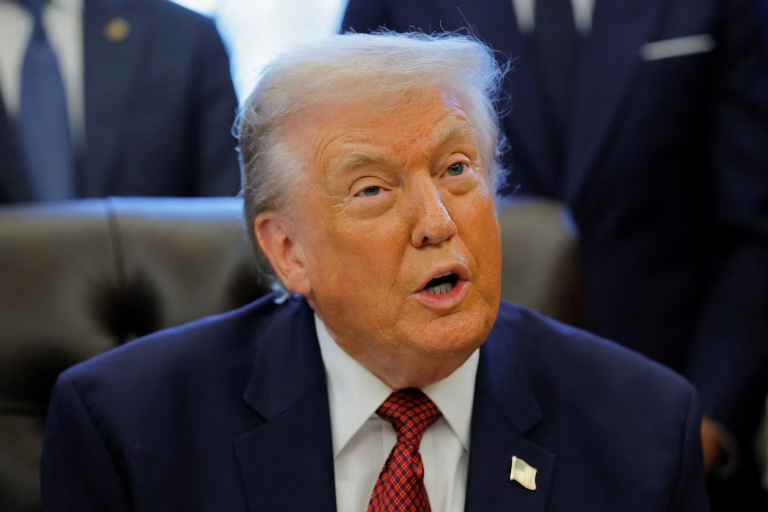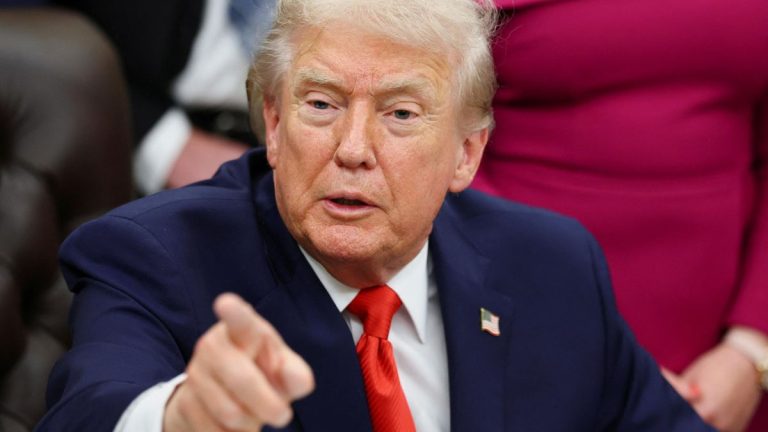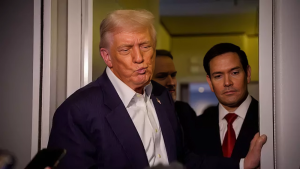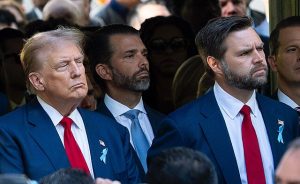WASHINGTON, D.C. — The Senate voted Tuesday to overturn President Donald Trump’s tariffs on Brazilian exports, marking one of the most significant bipartisan challenges yet to his trade policies.
In a 52–48 vote, lawmakers approved a resolution to repeal the tariffs, with five Republican senators joining Democrats in support of the measure. The move, while largely symbolic, reflects growing unease in Congress over the economic consequences of the president’s tariff strategy and the broader diplomatic tensions it has created with key trading partners.
The legislation — spearheaded by Sen. Tim Kaine (D–Va.) — seeks to roll back import duties Trump imposed on Brazil earlier this year. Those duties, which reached as high as 40 percent on some products, have strained relations between Washington and Brasília and prompted criticism from U.S. manufacturers reliant on Brazilian materials.
Although the measure passed the Senate, House Speaker Mike Johnson (R–La.) has indicated he does not intend to bring it to the floor for a vote, effectively halting its progress for now. The White House has also signaled that President Trump is unlikely to sign the legislation should it reach his desk.
A Symbolic Vote with Real Political Weight
The Senate’s action underscores rare bipartisan concern about the long-term effects of Trump’s aggressive trade tactics.
“This is not about partisanship — it’s about policy,” Kaine said in remarks following the vote. “We all want to protect American workers, but tariffs that isolate our allies and drive up costs at home are counterproductive.”
Republican Senators Lisa Murkowski of Alaska, Susan Collins of Maine, Mitch McConnell and Rand Paul of Kentucky, and Thom Tillis of North Carolina broke ranks to support the resolution. Their votes gave Democrats the narrow majority needed for passage.
For Murkowski, the issue was one of consistency. “We can’t have trade policy that shifts every few months depending on which country we’re targeting,” she said. “That unpredictability hurts American businesses.”
The White House has maintained that the tariffs were necessary to respond to what Trump called “unfair treatment” of U.S. companies and the “political persecution” of former Brazilian President Jair Bolsonaro, a longtime ally.
But for senators on both sides of the aisle, the costs — both economic and diplomatic — appear to have outweighed the intended message.
How the Tariffs Began
The administration first imposed a 10 percent duty on Brazilian imports last year, citing alleged market manipulation and human rights concerns. Over time, that rate was increased to 40 percent on certain key exports, bringing the effective tax on some goods to 50 percent when combined with existing import duties.
The move was widely interpreted as retaliation for Brazil’s prosecution of Bolsonaro, who was convicted in 2024 for attempting to overturn the results of his country’s 2022 election. Bolsonaro, once one of Trump’s closest international allies, is now serving a 27-year prison sentence for plotting to stay in power after losing to Luiz Inácio Lula da Silva.
Trump has publicly criticized Brazil’s judiciary, accusing it of conducting a “witch hunt” against Bolsonaro. The administration used the Magnitsky Act to sanction Brazilian Supreme Court Justice Alexandre de Moraes, who oversaw the case, and revoked visas for several senior Brazilian officials, including Solicitor General Jorge Messias.
A Diplomatic Balancing Act
Despite the tensions, recent weeks have brought signs of thawing relations between Washington and Brasília. Earlier this month, Trump held what both governments described as a “positive” phone call with President Lula da Silva, who requested a rollback of the tariffs and greater trade cooperation.
According to official statements, the two leaders spoke for roughly 30 minutes and exchanged direct contact information to facilitate ongoing dialogue. Da Silva proposed an in-person meeting during the ASEAN Summit in Malaysia, or alternatively in Washington.
Brazilian Finance Minister Fernando Haddad, Vice President Geraldo Alckmin, and Foreign Minister Mauro Vieira were present for the call, which Haddad described as “constructive.”
Markets in São Paulo responded positively to the news, with energy and agriculture stocks climbing amid optimism that a reduction in tariffs could be forthcoming.
“We had a very good call,” Trump told reporters afterward. “We want fair trade with Brazil. They’ve been great partners in many ways.”
Still, the president stopped short of confirming whether the tariffs would be lifted, saying only that “discussions are ongoing.”
Senate’s Message: Oversight and Restraint
While Tuesday’s vote will likely not alter trade policy in the short term, senators described it as a necessary statement of congressional oversight.
“The Constitution gives Congress the power over trade,” said Sen. Kaine. “This is a reminder that we can’t hand that power entirely to the executive branch.”
The vote marks the third time Democrats have sought to repeal or limit the administration’s tariff authority. In April, the Senate passed a similar resolution targeting tariffs on Canadian imports, which won support from four of the same Republicans who voted in favor of Tuesday’s bill.
A separate effort to overturn Trump’s 10 percent across-the-board tariff plan failed earlier this year after McConnell abstained.
For Senate Minority Leader Chuck Schumer (D–N.Y.), Tuesday’s outcome demonstrates that even some of Trump’s allies recognize the domestic costs of his trade strategy.
“This was a bipartisan acknowledgment that tariffs are taxes on American consumers,” Schumer said. “They drive up prices, strain alliances, and don’t achieve the outcomes promised.”
The Administration’s Defense
The Trump administration has defended its Brazil policy as part of a broader effort to strengthen leverage in trade negotiations and protect U.S. manufacturing.
In a statement issued before the vote, the White House said the tariffs “ensure reciprocity and fairness in U.S.–Brazil trade relations” and are “essential to counter unfair subsidies and hostile actions taken by certain elements within the Brazilian government.”
Administration officials also suggested the tariffs were designed to pressure Brasília into reforms aimed at reducing corruption and strengthening private investment.
Critics, however, argue that the measures have instead hurt American exporters and raised costs for key industries, including steel, agriculture, and construction.
Global Trade Ripples
The Brazil tariffs are part of a wider pattern of trade friction under Trump’s second term. Just one day after the Senate vote, the president announced a new trade agreement with South Korea, following weeks of negotiation.
“We reached a deal,” Trump told reporters during his Asia tour. “We came to a conclusion on a lot of very different items — great session.”
According to South Korean officials, the agreement reduces U.S. import tariffs on automobiles from 25 percent to 15 percent, a major concession for automakers like Hyundai and Kia. The White House characterized the move as a “balanced adjustment” designed to support domestic manufacturing while strengthening bilateral trade ties.
Analysts say the contrasting approaches — easing tariffs for one ally while maintaining steep taxes on another — highlight the administration’s case-by-case strategy, one that blends pressure and partnership.
Economic Impact and Outlook
Brazil remains one of the world’s largest exporters of agricultural commodities, metals, and manufactured goods. U.S. companies rely heavily on Brazilian steel, ethanol, and industrial inputs, meaning the tariffs have had ripple effects across supply chains.
According to a recent analysis by the U.S. Chamber of Commerce, American firms paid an estimated $4.6 billion in additional costs due to the tariffs since their introduction.
Economists warn that extended trade uncertainty could dampen investment on both sides. “The unpredictability alone is enough to make companies reconsider supply routes,” said one trade analyst in Washington. “Every headline moves markets.”
Still, Trump’s supporters argue the tariffs are a useful bargaining tool. “You don’t get good trade deals by being predictable,” said a senior administration official. “These measures are leverage, and they work.”
What Happens Next
With the House unlikely to take up the Senate’s resolution, the repeal effort appears to have stalled — for now. However, congressional aides say the bipartisan nature of the vote sends a clear message: skepticism over Trump’s trade policies is growing, even within his own party.
The Senate’s move also raises questions about how future administrations will balance executive power and legislative oversight in shaping U.S. economic policy.
For Brazil, the vote is a signal that parts of Washington remain open to dialogue, even as official relations remain strained.
As one diplomat in Brasília put it: “The vote may be symbolic, but symbols matter. They show that channels of cooperation are still open.”

Sarah Mitchell is a bestselling novelist recognized for her insightful and emotionally resonant stories that explore the complexities of human relationships. Originally from Denver, Colorado, Sarah grew up in a family of teachers who nurtured her curiosity and love for storytelling. She studied psychology at Stanford University, where she became fascinated by the intricacies of human behavior—an interest that would later shape her writing career. Sarah’s novels are praised for their nuanced characters, intricate plots, and ability to capture the subtle tensions that define love, friendship, and family ties. Her breakthrough novel, The Spaces Between Us, became an instant bestseller, lauded for its honest portrayal of strained family relationships and the fragile bonds that hold people together. Since then, she has published several works that continue to captivate audiences around the world. Outside of her writing career, Sarah is passionate about mental health advocacy and often partners with organizations to promote awareness and support for those struggling with emotional well-being. Her personal life is quieter—she enjoys hiking in the Colorado mountains, practicing yoga, and spending time with close friends. With each new book, Sarah Mitchell cements her reputation as a writer who illuminates the beauty and struggles of human connection.




